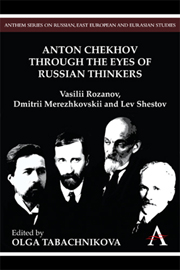 Anton Chekhov Through the Eyes of Russian Thinkers
Anton Chekhov Through the Eyes of Russian Thinkers Book contents
- Frontmatter
- Contents
- Acknowledgments
- Introduction
- List of Names
- List of Russian Cultural Concepts
- Three Brief Biographies – Rozanov, Merezhkovskii and Shestov
- Part One Vasilii Rozanov
- 1 Rozanov on Chekhov: ‘Overcoming Literature’ and Extending Horizons
- 2 Kind and Quiet: Vasilii Rozanov's Reading of Chekhov
- 3 Contemporaneity, Competition and Combat. Facts and Fictions about Everybody and Passiveness, Orientalism and Anaesthesia in Rozanov's View on Chekhov
- 4 ‘Tree of Life’ and ‘Dead Waters’: Why was Rozanov Afraid of Chekhov?
- Part Two Dmitrii Merezhkovskii
- Part Three Lev Shestov
- Notes on Contributors
4 - ‘Tree of Life’ and ‘Dead Waters’: Why was Rozanov Afraid of Chekhov?
from Part One - Vasilii Rozanov
Published online by Cambridge University Press: 05 March 2012
- Frontmatter
- Contents
- Acknowledgments
- Introduction
- List of Names
- List of Russian Cultural Concepts
- Three Brief Biographies – Rozanov, Merezhkovskii and Shestov
- Part One Vasilii Rozanov
- 1 Rozanov on Chekhov: ‘Overcoming Literature’ and Extending Horizons
- 2 Kind and Quiet: Vasilii Rozanov's Reading of Chekhov
- 3 Contemporaneity, Competition and Combat. Facts and Fictions about Everybody and Passiveness, Orientalism and Anaesthesia in Rozanov's View on Chekhov
- 4 ‘Tree of Life’ and ‘Dead Waters’: Why was Rozanov Afraid of Chekhov?
- Part Two Dmitrii Merezhkovskii
- Part Three Lev Shestov
- Notes on Contributors
Summary
Unanswered Letter
‘Of Anton Chekhov [Vasilii Rozanov] once said: ‘Chekhov?–nothing particular in him. He looked at life, and what he saw he wrote down. A very fine writer, people got to like him, and began to like him. But he is a cold one, and there's nothing particular in him. I understand his success but don't enjoy it.’ On another occasion, in 1897, Rozanov dryly remarked: ‘I do not like Merezhkovskii, Chekhov …Nietzsche.’ In 1914 in the article ‘Anton Chekhov’, Rozanov does not simply dismiss Chekhov; instead, he is rather disturbed by the phenomenon of this ‘genius of mediocrity',’ as he calls him. We can even see in the author of The Dark Countenance some traces of sympathy toward Chekhov, as the author of ‘Peasant Women’ (Baby)–the story that Rozanov interpreted in the spirit of his own polemics with Christianity and reflections on Russian women and family: ‘Peasant Women’ should be included in its entirety in ‘The History of the Russian Family’, in ‘The History of Russian Life’ [byt], in ‘The History of the Russian Woman’, postulates Rozanov. Finally, in his literary ‘embryos’ from 1916 known under the working title The Last Leaves (one of the unrealized sequels to Solitaria), Rozanov lists Chekhov together with two other ‘significant’ writers whom he greatly admired, Konstantin Leont'v and Lev Tolstoy, under the rubric of unrealized friendships:
I have lived all my life with utterly useless people. And when I was interested in [someone] — from the distance.
(on the copy of Chekhov' letter)- Type
- Chapter
- Information
- Anton Chekhov Through the Eyes of Russian ThinkersVasilii Rozanov, Dmitrii Merezhkovskii and Lev Shestov, pp. 63 - 90Publisher: Anthem PressPrint publication year: 2010
